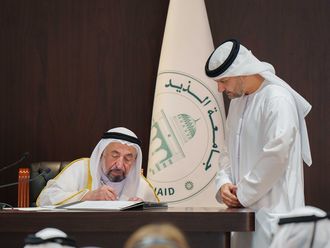Dubai: Private schools in Dubai will receive 2,600 new teachers raising the number in proportion with the increase in students, Gulf News has learnt.
The number includes 341 Islamic Education and Arabic teachers from 82 private schools, while the rest are spread across different subjects.
Each of Dubai’s 148 private schools have appointed new teachers, while also releasing many existing ones who either left the country or joined other schools in Dubai.
The Knowledge and Human Development Authority (KHDA), which oversees all private education operations in the emirate, said it studied all the 2,600 applications and approved their appointments only after finding their qualifications at satisfactory levels.
Teachers appointed by schools are required to be approved and registered with KHDA. Valid teaching credentials are required for all teachers appointed in Dubai’s schools.
KHDA personally interviews all Islamic Education and Arabic teachers seeking a job in Dubai to ensure they meet quality standards prior to being appointed by their schools.
The authority checks the qualifications and experience of other teachers before issuing a teaching permit, which teachers must submit to the UAE Ministry of Labour in order to finalise their contracts and be granted an employment visa.
“The interviews and approvals process is very important in making sure that we appoint teachers who understand the culture of Dubai and are able to raise awareness of national identity among Emirati students,” said Abdul Rahman Nasser, executive director of customer relations at KHDA
Taking into account the number of teachers who have resigned this year, the total number of teachers educating 210,000 students exceeds 13,000.
According to KHDA’s figures Dubai has a student-teacher ratio of 16:1, which is among the best.
Unesco figures reveal that the developed countries have a student-teacher ratio of 13.7:1.
Among different curriculum schools in Dubai, Indian schools have the worst student-teacher ratio of 21:1, while UK, US schools have a student-teacher ratio of 14:1.
Over the last five years 24 new schools have come into existence, adding 39,000 students to Dubai’s education landscape, showing an impressive growth of 7.1 per cent in student enrolment.
Ruling out any shortage of teachers for the fast growing number of students, KHDA said that the growth in number teachers at 7.6 per cent has also been in proportion with the growth of students.
“It’s not easy to maintain pace with such high demand and obviously some schools do struggle to find teachers but there has been no shortage as such,” said Nasser.
Of the total number of teachers in Dubai 80 per cent are female, while there are a handful of Emirati female teachers, there are no male Emirati teachers in private schools.
Private schools have an average of 25 pupils per class of which 14.4 per cent are Emiratis.
The impressive growth in the student population of Dubai continues as KHDA this year has approved transfer of 15,000 students, a huge proportion of which are new students while the rest are existing ones.
As part of its preparation for the new academic year the authority is coordinating the distribution of Islamic Education and Arabic textbooks from the UAE Ministry of Education to each private school in Dubai.
“All private schools must use Ministry of Education textbooks for the teaching of Islamic Education and Arabic,” said Nasser.
“We make sure that there are adequate supplies of these books and that all schools receive them well ahead of time,” he added.












